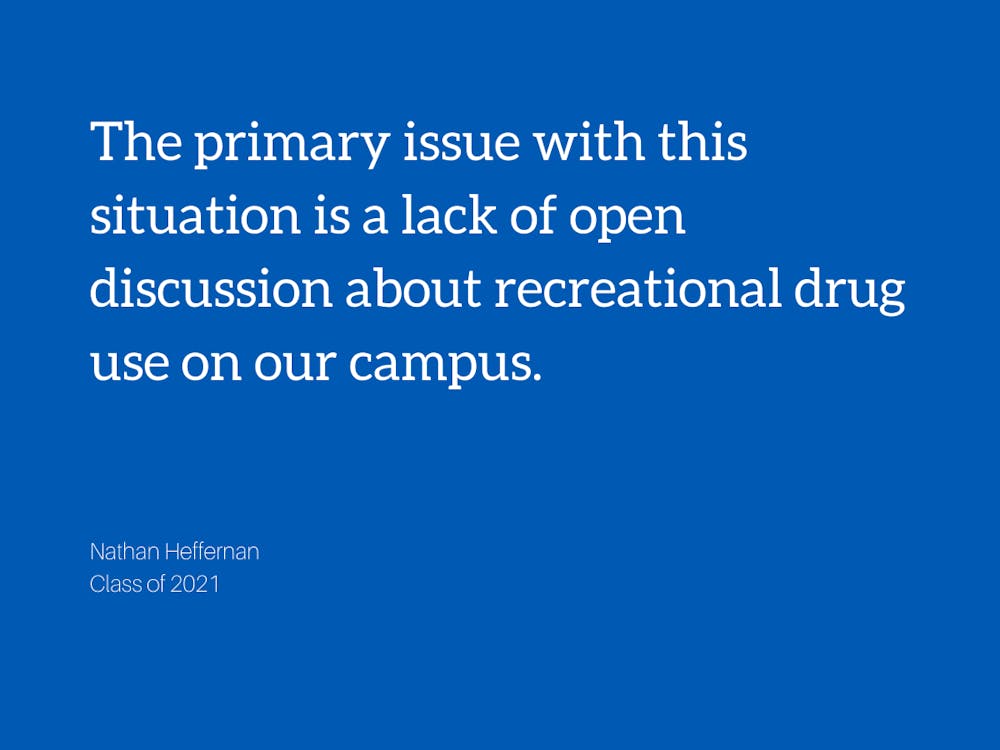Last week, graduating seniors were told in an email from Duke that their dorm items would be shipped to them by a third-party organization. Other undergraduates who plan to live on campus would have their items moved directly to their housing assignment for next year. The email left students with many uncertainties, but one question more important than the rest: what will they do with the drugs they find?
There are many dorm room items students do not want others handling for valid reasons, such as personal documents or sexual pleasure devices. The move-out process will have plenty of embarrassing and sensitive moments for most students. But beyond the uncomfortable, there are potential items that violate housing rules and sometimes state law. Although my own dorm room currently has nothing more scandalous than a James Dean poster, I imagine other students might be in trickier situations.
Hard liquor is prohibited, even on West Campus and for students over the age of 21. Depending on the circumstances, students may face disciplinary action for any evidence of hard liquor found in their own dorm room. Another housing violation is “borrowed” furniture from common spaces or other Duke facilities. As an RA last year, we were asked to perform several witch hunts to track down residents who took common room furniture. I wonder if the same degree of enforcement will be applied when movers stumble upon the missing upright piano in Edens 4D, or chairs from the pre-renovation Craven.
While I expect administration to overlook housing violations of candles or West Union dishes, the presence of illegal substances poses a unique problem. Duke students are typically afforded leniency when it comes to substance use, as housing and residence life focuses on upholding community norms and safety rather than individual punishment. This aids a healthier relationship with students and on-campus resources when it comes to medical emergencies or safety concerns. The Durham community is not afforded the same treatment, as the effects of harsh drug sentencing are continuously felt by the community.
Aside from alcohol and caffeine, the most common substance used by college kids is marijuana. The United States is experiencing rapidly changing marijuana laws; 11 states have fully legalized recreational marijuana use. Many others have either decriminalized or legalized medical use of the substance. Duke’s campus culture reflects the gray legal area the drug seems to exist in, as well as the stark generational divide in supporting widespread legalization. This moving situation could bring those conflicts into light.
When I was an RA last year, I found the housing policies on marijuana to be complex and confusing, but well-intentioned. However, the issue with ambiguity is unfair enforcement towards certain individuals. In the U.S. justice system, we have seen the devastating effects on communities of color. In my time working for HRL, I never was put in a situation where I had to enforce these policies that I often disagreed with. But I observed instances where students suffered consequences for doing activities other students participated in, due to bad luck and being in the wrong situation.
When it comes to the move-out situation, I am concerned about the ambiguity students will be left with when it comes to illicit substances (of all nature). I doubt students will receive specific guidance, given the taboo nature of talking about recreational drug use. It’s a silent factor of life on Duke’s campus, that is joked about frequently and discussed scarcely. Students may be left to decide on-the-spot how to handle any substances left in their dorms, and how to work with the professional movers to either dispose or keep these things hidden.
Let’s entertain the hypothetical situation that a student has an illegal substance hidden in a bag or box that can easily be shipped. Does this student ask the movers to remove the substance and risk being reported, or do they say nothing and risk their package being confiscated by the postal service? If it gets confiscated, who faces the legal charges of shipping illicit substances? Duke or the student? The possibilities are numerous, especially when you consider that many students have roommates as well. Even prescription drugs pose similar legal ramifications. Duke could benefit by guaranteeing no consequences for students who ask movers to throw away certain substances.
The primary issue with this situation is a lack of open discussion about recreational drug use on our campus. This is understandable, given the illegal nature of many of these substances. But even for other drugs such as alcohol or misused prescription medicine, there is a lack of conversation on impacts on physical and mental health. Substance use remains one of the most present and least talked about topics on our campus. I hope more students and administrators find the opportunity and space to discuss these topics with the candor required.
Over 85% of Americans ages 18-34 support the legalization of marijuana. It’s a stunning distinction from older generations, and an indication of how rapidly public opinion is changing. But existing stigma prevents young people from speaking candidly on the topic, as well as accessing accurate and helpful information on both the benefits and negative effects. As Duke unknowingly packs up students’ stashes, maybe we can unpack our opinions in an honest and productive manner.
Nathan Heffernan is a Trinity junior. His column runs on alternate Mondays. He spent last summer in California and just really appreciated the culture.
Get The Chronicle straight to your inbox
Signup for our weekly newsletter. Cancel at any time.

